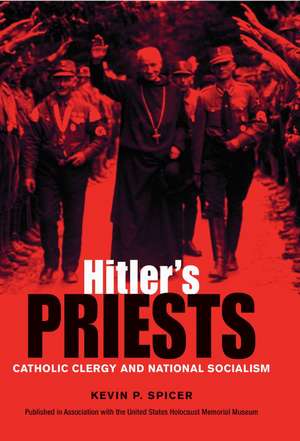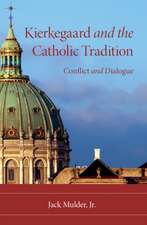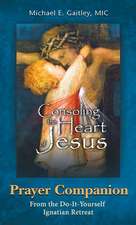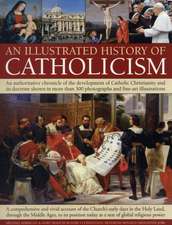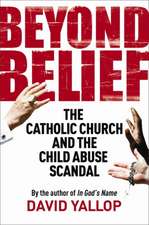Hitler's Priests: Catholic Clergy and National Socialism
Autor Kevin P. Spiceren Limba Engleză Paperback – 29 ian 2018
Shaken by military defeat and economic depression after War World I, Germans sought to restore their nation’s dignity and power. In this context the National Socialist Party, with its promise of a revivified Germany, drew supporters. Among the most zealous were a number of Catholic clergymen known as “brown priests” who volunteered as Nazi propagandists. In this insightful study, Spicer unearths a dark subchapter in Roman Catholic history, introduces the principal clergymen who participated in the Nazi movement, examines their motives, details their advocacy of National Socialism, and explores the consequences of their political activism.
Some brown priests, particularly war veterans, advocated National Socialism because it appealed to their patriotic ardor. Others had less laudatory motives: disaffection with clerical life, conflicts with Church superiors, or ambition for personal power and fame. Whatever their individual motives, they employed their skills as orators, writers, and teachers to proclaim the message of Nazism. Especially during the early 1930s, when the Church forbade membership in the party, these clergymen strove to prove that Catholicism was compatible with National Socialism, thereby justifying their support of Nazi ideology. Father Dr. Philipp Haeuser, a scholar and pastor, went so far as to promote antisemitism while deifying Adolf Hitler. The Führer’s antisemitism, Spicer argues, did not deter clergymen such as Haeuser because, although the Church officially rejected the Nazis’ extreme racism, Catholic teachings tolerated hostility toward Jews by blaming them for Christ’s crucifixion.
While a handful of brown priests enjoyed the forbearance of their bishops, others endured reprimand or even dismissal; a few found new vocations with the Third Reich. After the fall of the Reich, the most visible brown priests faced trial for their part in the crimes of National Socialism, a movement they had once so earnestly supported.
In addition to this intriguing history about clergymen trying to reconcile faith and politics, Spicer provides a master list—verified by extensive research in Church and government archives—of Catholic clergy who publicly supported National Socialism.
Some brown priests, particularly war veterans, advocated National Socialism because it appealed to their patriotic ardor. Others had less laudatory motives: disaffection with clerical life, conflicts with Church superiors, or ambition for personal power and fame. Whatever their individual motives, they employed their skills as orators, writers, and teachers to proclaim the message of Nazism. Especially during the early 1930s, when the Church forbade membership in the party, these clergymen strove to prove that Catholicism was compatible with National Socialism, thereby justifying their support of Nazi ideology. Father Dr. Philipp Haeuser, a scholar and pastor, went so far as to promote antisemitism while deifying Adolf Hitler. The Führer’s antisemitism, Spicer argues, did not deter clergymen such as Haeuser because, although the Church officially rejected the Nazis’ extreme racism, Catholic teachings tolerated hostility toward Jews by blaming them for Christ’s crucifixion.
While a handful of brown priests enjoyed the forbearance of their bishops, others endured reprimand or even dismissal; a few found new vocations with the Third Reich. After the fall of the Reich, the most visible brown priests faced trial for their part in the crimes of National Socialism, a movement they had once so earnestly supported.
In addition to this intriguing history about clergymen trying to reconcile faith and politics, Spicer provides a master list—verified by extensive research in Church and government archives—of Catholic clergy who publicly supported National Socialism.
| Toate formatele și edițiile | Preț | Express |
|---|---|---|
| Paperback (1) | 144.13 lei 3-5 săpt. | |
| Northern Illinois University Press – 29 ian 2018 | 144.13 lei 3-5 săpt. | |
| Hardback (1) | 212.04 lei 3-5 săpt. | |
| Northern Illinois University Press – 13 apr 2008 | 212.04 lei 3-5 săpt. |
Preț: 144.13 lei
Nou
Puncte Express: 216
Preț estimativ în valută:
27.58€ • 28.49$ • 22.96£
27.58€ • 28.49$ • 22.96£
Carte disponibilă
Livrare economică 04-18 martie
Preluare comenzi: 021 569.72.76
Specificații
ISBN-13: 9780875807881
ISBN-10: 0875807887
Pagini: 369
Dimensiuni: 152 x 229 x 28 mm
Greutate: 0.56 kg
Ediția:1
Editura: Northern Illinois University Press
Colecția Northern Illinois University Press
ISBN-10: 0875807887
Pagini: 369
Dimensiuni: 152 x 229 x 28 mm
Greutate: 0.56 kg
Ediția:1
Editura: Northern Illinois University Press
Colecția Northern Illinois University Press
Recenzii
“Spicer keeps his rhetorical balance very well, managing to convey the thinking of his protagonists fairly yet also to be judgmental where appropriate. His research is impeccably thorough and unparalleled in the existing literature.”—Peter Hayes, Northwestern University
“Hitler’s Priests will contribute to the much debated argument of the level of Catholic Church resistance, conformity, and accommodation to the Nazi regime. Spicer’s use of archival materials is almost superhuman. Perhaps the most important element ... is the information that he has managed to unearth on these fairly unknown individual priests.”—Beth A. Griech-Polelle, Bowling Green State University
"Deeply researched and deeply disturbing. Spicer's treatment of "Hitler's priests" is absolutely convincing."—The Washington Post
“Hitler’s Priests will contribute to the much debated argument of the level of Catholic Church resistance, conformity, and accommodation to the Nazi regime. Spicer’s use of archival materials is almost superhuman. Perhaps the most important element ... is the information that he has managed to unearth on these fairly unknown individual priests.”—Beth A. Griech-Polelle, Bowling Green State University
"Deeply researched and deeply disturbing. Spicer's treatment of "Hitler's priests" is absolutely convincing."—The Washington Post
Notă biografică
Kevin P. Spicer, C.S.C., is the James J. Kenneally Distinguished Professor of History at Stonehill College.
Cuprins
Table of Contents
Preface Introduction
1. Adapting Catholic Teaching to Nazi Ideology
2. In the Trenches for Hitler
3. The Old Fighters under Hitler's Rule
4. Antisemitism and the Warrior Priest
5. From Nationalism to National Socialism
6. Germanizing Catholicism
7. Judgment Day: Brown Priests on Trial?
Conclusion
Appendix 1: German Catholic Ecclesiastical Structure
Appendix 2: The Brown Priests: Biographical Data
Notes
Sources Cited
Index
1. Adapting Catholic Teaching to Nazi Ideology
2. In the Trenches for Hitler
3. The Old Fighters under Hitler's Rule
4. Antisemitism and the Warrior Priest
5. From Nationalism to National Socialism
6. Germanizing Catholicism
7. Judgment Day: Brown Priests on Trial?
Conclusion
Appendix 1: German Catholic Ecclesiastical Structure
Appendix 2: The Brown Priests: Biographical Data
Notes
Sources Cited
Index
Descriere
Shaken by military defeat and economic depression after War World I, Germans sought to restore their nation’s dignity and power. In this context the National Socialist Party, with its promise of a revivified Germany, drew supporters. Among the most zealous were a number of Catholic clergymen known as “brown priests” who volunteered as Nazi propagandists. In this insightful study, Spicer unearths a dark subchapter in Roman Catholic history, introduces the principal clergymen who participated in the Nazi movement, examines their motives, details their advocacy of National Socialism, and explores the consequences of their political activism.
Some brown priests, particularly war veterans, advocated National Socialism because it appealed to their patriotic ardor. Others had less laudatory motives: disaffection with clerical life, conflicts with Church superiors, or ambition for personal power and fame. Whatever their individual motives, they employed their skills as orators, writers, and teachers to proclaim the message of Nazism. Especially during the early 1930s, when the Church forbade membership in the party, these clergymen strove to prove that Catholicism was compatible with National Socialism, thereby justifying their support of Nazi ideology. Father Dr. Philipp Haeuser, a scholar and pastor, went so far as to promote antisemitism while deifying Adolf Hitler. The Führer’s antisemitism, Spicer argues, did not deter clergymen such as Haeuser because, although the Church officially rejected the Nazis’ extreme racism, Catholic teachings tolerated hostility toward Jews by blaming them for Christ’s crucifixion.
While a handful of brown priests enjoyed the forbearance of their bishops, others endured reprimand or even dismissal; a few found new vocations with the Third Reich. After the fall of the Reich, the most visible brown priests faced trial for their part in the crimes of National Socialism, a movement they had once so earnestly supported.
In addition to this intriguing history about clergymen trying to reconcile faith and politics, Spicer provides a master list—verified by extensive research in Church and government archives—of Catholic clergy who publicly supported National Socialism.
Some brown priests, particularly war veterans, advocated National Socialism because it appealed to their patriotic ardor. Others had less laudatory motives: disaffection with clerical life, conflicts with Church superiors, or ambition for personal power and fame. Whatever their individual motives, they employed their skills as orators, writers, and teachers to proclaim the message of Nazism. Especially during the early 1930s, when the Church forbade membership in the party, these clergymen strove to prove that Catholicism was compatible with National Socialism, thereby justifying their support of Nazi ideology. Father Dr. Philipp Haeuser, a scholar and pastor, went so far as to promote antisemitism while deifying Adolf Hitler. The Führer’s antisemitism, Spicer argues, did not deter clergymen such as Haeuser because, although the Church officially rejected the Nazis’ extreme racism, Catholic teachings tolerated hostility toward Jews by blaming them for Christ’s crucifixion.
While a handful of brown priests enjoyed the forbearance of their bishops, others endured reprimand or even dismissal; a few found new vocations with the Third Reich. After the fall of the Reich, the most visible brown priests faced trial for their part in the crimes of National Socialism, a movement they had once so earnestly supported.
In addition to this intriguing history about clergymen trying to reconcile faith and politics, Spicer provides a master list—verified by extensive research in Church and government archives—of Catholic clergy who publicly supported National Socialism.
